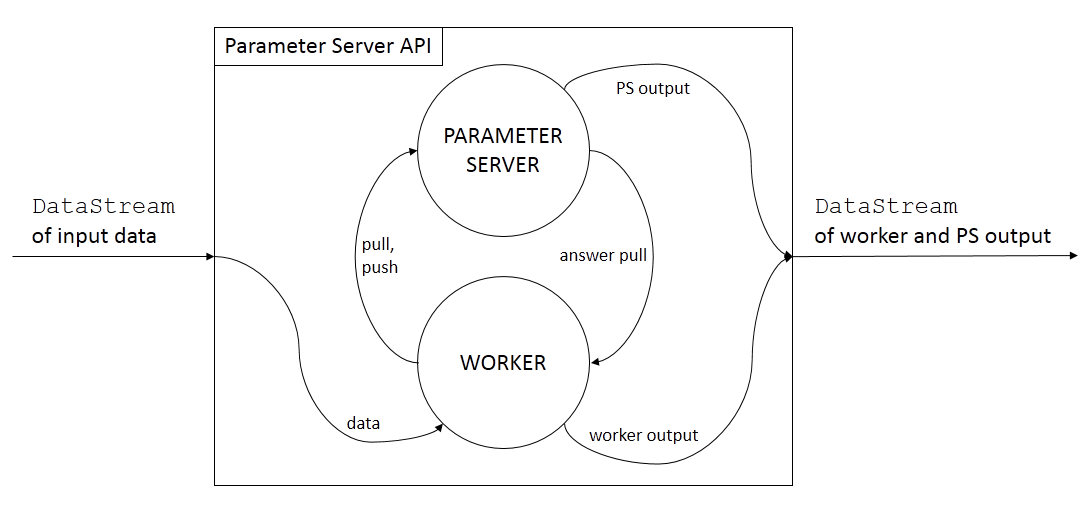A Parameter Server implementation based on the Streaming API of Apache Flink.
Parameter Server is an abstraction for model-parallel machine learning (see the work of Li et al.).
Our implementation could be used with the Streaming API:
it can take a DataStream of data-points as input, and produce a DataStream of model updates. This way, we can implement both online and offline ML algorithms. Currently only asynchronous training is supported.
Use SBT. It can be published to the local SBT cache
sbt publish-localand then added to a project as a dependency
libraryDependencies += "hu.sztaki.ilab" % "flink-ps" % "0.1.0"We can use the Parameter Server in the following way:
Basically, we can access the Parameter Server by defining a WorkerLogic, which can pull or push parameters. We provide input data to the worker via a Flink DataStream.
We need to implement the WorkerLogic trait
trait WorkerLogic[T, P, WorkerOut] extends Serializable {
def onRecv(data: T, ps: ParameterServerClient[P, WorkerOut]): Unit
def onPullRecv(paramId: Int, paramValue: P, ps: ParameterServerClient[P, WorkerOut]): Unit
}where we can handle incoming data (onRecv), pull parameters from the Parameter Server, handle the answers to the pulls (onPullRecv), and push parameters to the Parameter Server or output results. We can use the ParameterServerClient:
trait ParameterServerClient[P, WorkerOut] extends Serializable {
def pull(id: Int): Unit
def push(id: Int, deltaUpdate: P): Unit
def output(out: WorkerOut): Unit
}When we defined our worker logic we can wire it into a Flink job with the transform method of FlinkParameterServer.
def transform[T, P, WorkerOut](
trainingData: DataStream[T],
workerLogic: WorkerLogic[T, P, WorkerOut],
paramInit: => Int => P,
paramUpdate: => (P, P) => P,
workerParallelism: Int,
psParallelism: Int,
iterationWaitTime: Long): DataStream[Either[WorkerOut, (Int, P)]]Besides the trainingData stream and the workerLogic, we need to define how the Parameter Server should initialize a parameter based on the parameter id (paramInit), and how to update a parameter based on a received push (paramUpdate). We must also define how many parallel instances of workers and parameter servers we should use (workerParallelism and psParallelism), and the iterationWaitTime (see Limitations).
We implement the two-way communication of workers and the parameter server with Flink Streaming iterations, which is not yet production-ready. The main issues are
- Sometimes deadlocks due to cyclic backpressure. A workaround could be to limiting the amount of unanswered pulls per worker (e.g. by using WorkerLogic.addPullLimiter), or manually limiting the input rate of data on the input stream. In any case, deadlock would still be possible.
- Termination is not defined for finite input. As a workaround, we can set the
iterationwaitTimefor the milliseconds to wait before shutting down if there's no messages sent along the iteration (see the Flink (Java Docs)https://ci.apache.org/projects/flink/flink-docs-master/api/java/)). - No fault tolerance.
All these issues are being addressed in FLIP-15 and FLIP-16 and soon to be fixed. Until then, we need to use workarounds.
